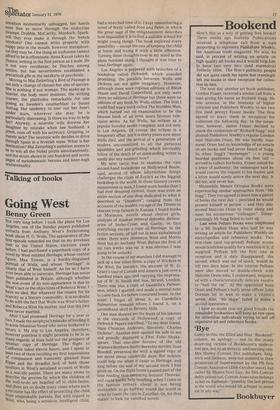; Talking of books
Going West
Penny Green
Not very long before I took the plane for Los Angeles, one of the Sunday papers published extracts from Anthony West's forthcoming book about H. G. Wells. The appearance Of the first episode reminded me that on my previous visit to the United States, nienteen years before, I had purchased a paperback copy of a novel by West entitled Heritage, whose central figure, Max Towne, is a hardly-disguised Portrait of Wells, and whose "heritage" is clearly that of West himself. As far as I have .ever been able to ascertain, Heritage has never been published in Britain, although whether the non-event of its non-appearance is due to West's tact or the objections of Rebecca West, I have no idea. But whatever the reason for its scarcity as a literary commodity, it is no doubt t° do with the fact that Wells was West's father and Rebecca West his mother, and that the two Were never married.
After I had possessed Heritage for a year or tWo, I made the neophyte's mistake of lending it to some felonious friend who never bothered to return it. My trip to Los Angeles, therefore, however pointless it might promise to be in so Many regards, at least held out the prospect of another copy of Heritage. The flight to California takes eleven hours, and I spent at least two of them recalling my first impressions Of compassion and humanity gleaned from iCiPPs and the dreadful lack of both those qualities in West's serialised account of Wells as a real-life parent. There are many terms to describe the process by which the children of the well-to-do are bundled off to child-farms, and there are no doubt many cases where such a recourse has the effect of protecting the child froni unspeakable parents. But with regard to West, who, being a sensitive, intelligent child, had a wretched time of it, 1 kept remembering a novel of Wells' called Joan and Peter, in which
the great sage of the enlightenment describes how impossible it is to find a suitable school for bright young things. The book explored every
possibility — except the one of keeping the child at home and trying it with a little affection. Turning these thoughts over in my mind as the plane rumbled along, I thought it was time to read Heritage again.
Los Angeles is peppered with branches of a bookshop called Pickwick, which sounded
promising; the parallels between Wells and
Dickens are not quite imaginary. However, although there were copious editions of Bleak House and David Copperfield, not only were there no editions of Heritage but there were no editions of any book by Wells either. The best I could find was a work called The Invisible Man, which turned out on examination to be the fatuous book of an even more fatuous television series. As for Wells, his eclipse as a popular novelist seems complete, and not only in Los Angeles. Of course the eclipse is a temporary affair, but it is thirty years now since Wells died, and the arrival of a generation of readers uncommitted to all the personal squabbles and axe-grinding which inevitably follow of the death of an outstanding writer is surely due any moment now?
My next tactic was to examine the vast second-hand bookshops on Hollywood Boulevard, several of whose labyrinthine design challenges the claim of Foyle's as the biggest bookshop in the world. In these literary cavern measureless to man, I found more books than I had ever dreamed existed; there was even an entire section of one shop dedicated to what it described as "Disasters", ranging from the accounts of the maiden voyage of the Titanic to obscure crop failures in Kansas. I found books on Mormons, novels about chorus girls, analyses of Alaskan mineral deposits, dictionaries of Serbo-Croat and Gaelic, in fact everything except a copy of Heritage. In the fiction sections, all laid out in neat alphabetical order, there were Jessarnyn West and Morris West but no Anthony West. Before the first of my two weeks was up, it was obvious I was going to be unlucky. In the course of my searches I did manage to pick up a few other items, a copy of Wickets in the West, for instance, the account of W. G. Grace's tour of Canada and America just over a hundred years ago, and carrying the imprimatur of W. H. Smith and Son, Strand, London. There was also a copy of Guedella's Palmerston, which I spotted, and made a mental note to come back for before I returned home. In the event I forgot all about it, so Guedella's Palmerston remains where I found it, on a secondhand shelf in Beverly Hills.
One man showed me the fruits of his labours in the vineyards of Hollywood, a copy of Pickwick Papers inscribed, "To my dear friend, Hans Christian Andersen, Sincerely, Charles Dickens". Another man opened his safe to me and proudly displayed a First Folio Shakespeare. That one-time heroine of the old Warners Brothers-Busby Berkeley movies, Joan Blondell, presented me with a signed copy of her novel about vaudeville days. But nobody could help me when it came to Heritage, and long before the end of my second week I had given up. On the flight home I passed part of the time reading that hectoring lecturer Thoreau, and could hardly help laughing when I came to the famous remark about it not being worthwhile to go halfway round the world in order to count the cats in Zanzibar. Or, for that matter, to look for vanished novels.


























 Previous page
Previous page